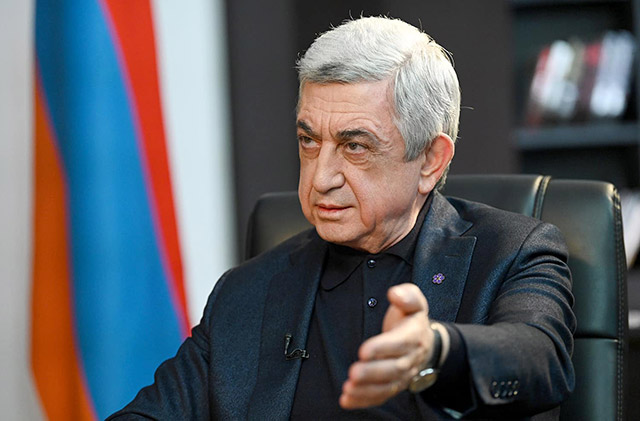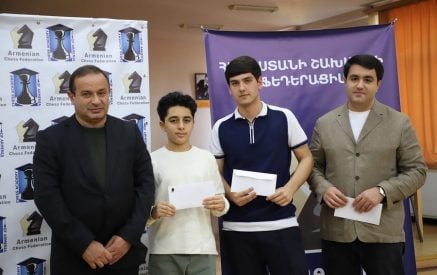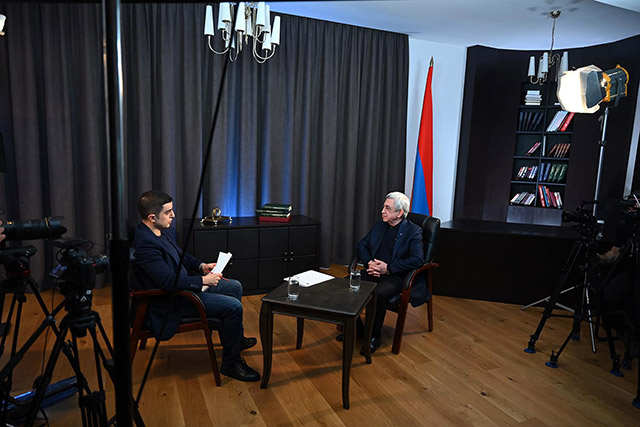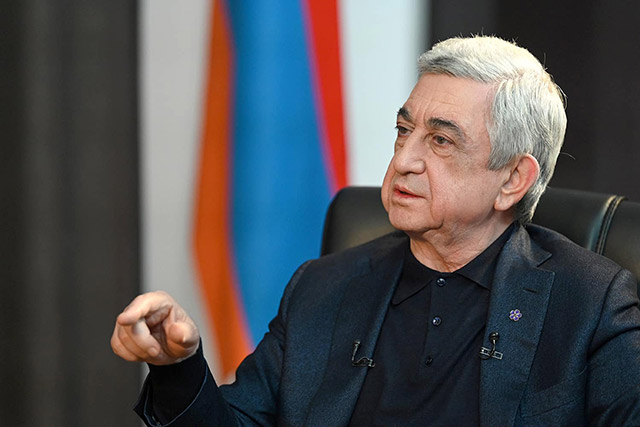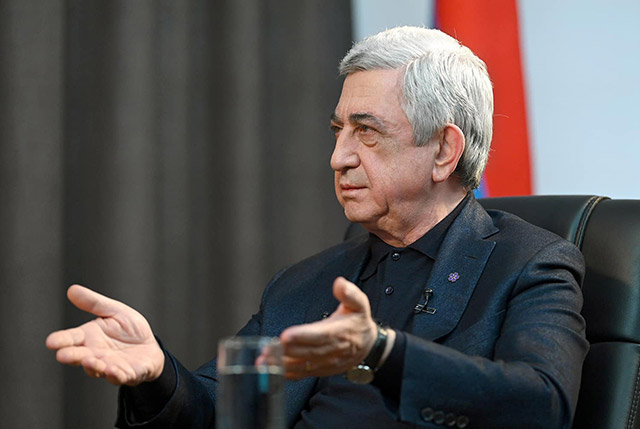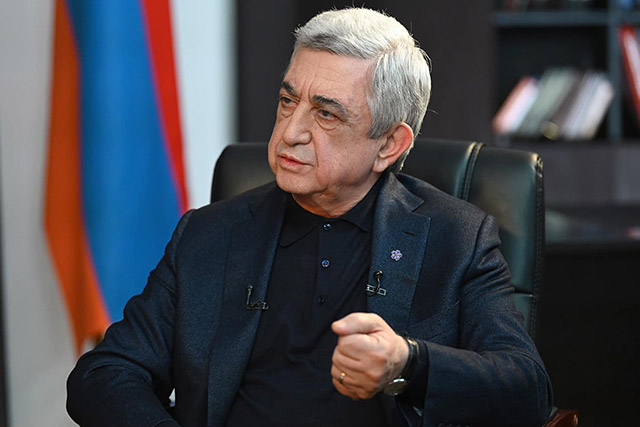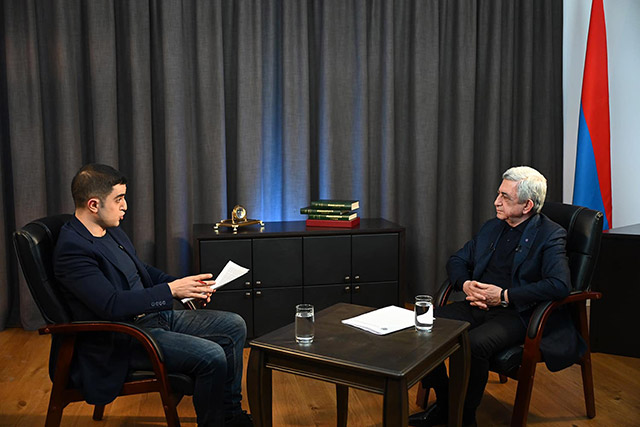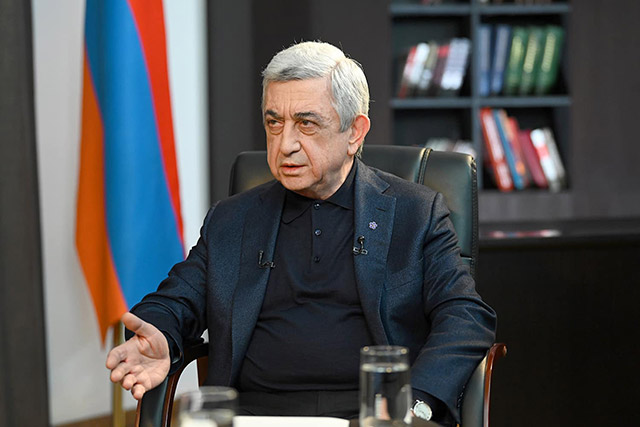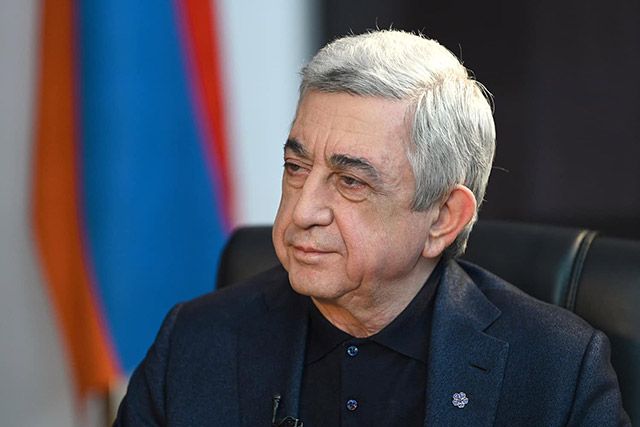Armenia’s third President Serzh Sargsyan’s exclusive interview
Good evening. Third President of Armenia Serzh Sargsyan has kindly accepted my invitation and we will talk about the negotiaton process for the conflict resolution in Artsakh.
Hello, Mr President. Thank you for accepting my invitation and for this opportunity.
Read also
A moment ago we were watching with you a short video narrating the main features of the negotiation process during ten years of your tenure in office. The video presented the historical timeline of summits at the Presidential level and meetings between the Foreign Ministers, the key milestones and main negotiated documents. You, as well as the co-chairs upon necessity, have made all this public in the past.
A few days ago the Prime Minister said that there was no any information pertaining to the settlement in Artsakh which you would know and he would not. He claimed the entire relevant information has been put on his table since 2018.
On the other hand, the allegations about what you have negotiated during those ten years in office and what you argue was your legacy as negotiation portfolio left to the incumbent Prime Minister, are diametrically different.
How could that be the case?
You know, I could consider it below my sense of dignity and skip touching upon all those speeches and interviews during the past 1.5 months, which had been full of complete lies, fabrications, inaccuracies and manipulations. But there are two things that made me accept your invitation. First among those is that the presumptuous expression, which we all heard, claiming he possesses the full-scale information regarding the negotiations and the negotiation process itself, is a complete lie. It’s a lie, because it is impossible just to read the documents and be fully aware of the negotiation process. It’s impossible just by reading a paper. I would just say that even I cannot claim that I was aware of absolutely all the outstanding details, because except the negotiations that I was in, there was also Foreign Minister Edward Nalbandyan who was preparing those negotiations and steering the pre-negotiation phase. This is a very important aspect to mention.
This begs a question. When we came to power, how did it happen that from the very outset we, in our opinion, continued going in the right direction? That’s because we – that means not only myself, but also Edward Nalbandyan – not just for hours, not just for days or months, but for years really were discussing the relevant questions with those people who were fully aware of all the previous phases of the process.
And there is one other factor that influenced my decision. If they are so presumptuous to declare that they have had complete information at their disposal, how did it happen that in 2019 they were trapped down? I mean when they were offered a new – I’ll put it this way – a new document and they accepted that document as a basis for negotiations, for a full year they were lying to the Armenian society, but not only Armenian society, suggesting that there was no any negotiation process.
Until Lavrov declassified that…
Correct. But before this declassification by Lavrov, we were voicing alarm, we were saying that there were negotiations, that there were new proposals, since without all that what would the Foreign Minister be speaking with his Azerbaijani counterpart? At the end of the day they were embarrassed before the whole world, right when – as you noted – Foreign Minister Lavrov uncovered that entire process.
Mr President, you are right that the documents at the end of the day were the end result, i.e. the parties normally negotiate for extended periods and then agree to put on paper the compromise option, paragraph by paragraph. In that sense, it’s difficult to know everything about the process that led to previously negotiationed documents, but the result is
And yes, in that sense it is difficult to master the process of previously negotiated documents, but the outcome is before our own eyes. When you are saying that just by reading a document it’s impossible to know everything about the realities of negotiations, you can be blamed – and you are in fact being blamed – for certain verbal agreements. And the Prime Minister claimed in his latest Facebook press conference, that certain promises had been made by you personally and that in 2018-2019 it was the time to fulfill those promises which were not reflected in any of the documents.
Davit, I have to try to correct you and say that he has not said all that directly. True to his style, he has made an allusion to that, which he can renounce every other second.
I can say the following: absolutely no any verbal promise has been made. It has never been our workstyle – to yield something in accordance with verbal arrangements, be that something tangible or not.
But let me continue speaking about the first aspect and tell you that when I was listening to the portions about Artsakh in that interview, it was astonishing to hear some so-called “arguments”, which I heard in 2008, 2009 and 2010 from the President of Azerbaijan. It would seem to me at certain moments – to be ver honest with you – that it was Azerbaijani President speaking, not Armenia’s governor. It was very painful, because he no longer could use those objective arguments that would give us good chances to achieve a status for Artsakh, as if he tries to put forward those arguments tomorrow, he will be reminded of his own words used.
Mr President, I can guess what arguments you mean. I have those grouped and will ask you to touch upon each of those in a nutshell.
Just let me mention about the second aspect too. Secondly, I have come to observe that among certain political forces in Armenia and many intelligent people there is a sense of disillusionment. There is a certain atmosphere of disappointment. And the allegations of those – I mean both the incumbent authorities here and those in Azerbaijan – that the Nagorno Karabakh issue is resolved, has in some ways affected these people. I have come on air to declare once again that Artsakh will never be part of Azerbaijan. And for that – despite the calamitous war, despite the capitulation – there are still opportunities to be seized.
You have always said that Nagorno Karabakh will never be part of Azerbaijan. In your latest party congress you said that Artsakh will always remain Armenian, and the governing party has attempted to fish for some verbal nuances in your statement.
But is there any difference? I mean – what does “only Armenian” mean, can you explain?
That Armenian Artsakh can not be part of Azerbaijan.
Of course, it cannot. Maybe I am rushing it and answering some questions that you have not yet asked, including some of his so-called ‘arguments’, such as – what would happen if there were elections held and Azeris elected… What are we? Some fascists? Are we racists to argue that the parliament of Artsakh has to be made up of only Armenians? If it consists of not only Armenians, how does it mean it’s no more Armenian? Are there only Armenians elected in the Armenian National Assembly today? What does it all mean? If this is yet another manipulation, it’s a failed one. If this is – what can I say – an issue about lack of knowledge, then it’s ridiculous. What I am saying is, of course, also a message to the international community, because the very same co-chairmen, even after the disastrous war still were speaking about the basic principles.
But it’s been a while since they did that last.
It’s been a while, because no one is speaking about that any more. Have you come across any clear answer by the incumbent Armenian officials about the future of the Karabakh issue? The most they do is making references to their government program adopted still before or maybe after the war. Why is that the case? Are they shy? Are they afraid? Or, as they say, they have some verbal agreements that impede making such statements?
Mr President, I would like to ask you react on a few arguments that were voiced by the Prime Minister in the course of the past few press conferences. First, the Prime Minister spoke a few times about a certain radical turning-point in the Nagorno Karabakh negotiation process in 2016. In every fitting occasion he labeled that ‘a catastrophe’. What happened after the April war and – I quote his claims — at that time Karabakh has lost every practical and theoretical chances of ever being outside of Azerbaijan. I would like to unequivocally clarify with you: in order to stop the war as soon as possible, in four days, or in the bilateral negotiations afterwards, or those under the auspices and with the participation of the co-chairs, has there been any concession forced onto Armenian side with regards to the interim or final status of Nagorno Karabakh; and has the Armenian side agreed to any such concession, I mean have we traded over that issue at all? The Prime Minister alleges that indeed, in 2016 it was the Armenian side that backpedalled on the status of Nagorno Karabakh.
Absolutely, there have been absolutely no pressure or no any concession, no written or verbal agreement or arrangement, and I have spoken about that. When I was speaking about the April war and when there was the Commission of Inquiry etc, I had very openly said that there had been only a verbal agreement to stop the war, while they were claiming that maybe there had been some written document, or some concession etc.
The Azeris were suggesting to sign a new ceasefire agreement, which you were against…
Absolutely. We had not agreed to any new document or any verbal agreement. That had been confirmed by the co-chairmen, when they publicly stated that there was no new document and that the trilateral agreement signed in 1994 remained in force.
So, the price for stopping the war was neither relinquishing any of the principles, nor any of the elements.
Absolutely.
What regards to the 2016 document, if you noticed, inbetween the lines there he was speaking about some letters and what not, and would not clearly say exactly what proposals were made by the co-chairmen in 2016, when those proposals were tabled, etc.
Indeed, in 2016 – that is after the April war – we did receive some proposals by the co-chairmen. And those proposals in no ways violated the red lines that we had always had. Let me reiterate again, that those red lines were the following: first – self-determination of Nagorno Karabakh, second – land border between Armenia and Nagorno Karabakh, third – recognition of Nagorno Karabakh authorities by the international community as legitimately elected officials, and many other such [features] that was [in entirety] called interim status. In one place it was called Nagorno Karabakh interim status, in other file it was called temporary status, somewhere else it was called recognised status. And fourth – something that was based on or was uniting the preceding three aspects in one – was the security guarantees. In our opinion the most important security guarantee was [Nagorno Karabakh’s] independence and it was the opportunity to influence all processes in a legitimate manner – be those security issues or others.
There was no reservation regarding any of these four elements.
Plus the necessity of introduction of moniting mechanisms was also added…
No, it was formulated slightly differently there, since there would be no need in monitoring given the peacekeeping forces were going to be dispatched to be lined up between two conflicting sides.
I rather meant, Mr President, the parties had such obligation before conflict resolution to make room for a monitoring mission.
That was in the form of statements in Vienna and St Petersburg in 2016, which of course was quite advantageous for the Armenian party, but none of that was any solution to the problem. That was very specific means which would exclude future hostilities.
Until a resolution was found?
Yes, until some resolution was found.
Pertaining to the UN Security Council, which to my bemusement is called ‘a catastrophe’, I have to say that it has always been the perception that a UN Security Council resolution [would be necessary]. If someone, who wants to speak about this topic, got detailed understanding of the Kazan document, they would see that the document, or that declaration, had it been accepted, it would need to be approved by the UN Security Council, since it included certain provisions that are generally within the powers of the UN, while the OSCE and moreover its Minsk Group, would not have been in the position of adopting such decisions.
Do you mean that a UN Security Council resolution was being spoken about even before the April war?
This idea or such a concept was featured in all of the documents. It was not inscribed in any of the documents that exactly that one has to be sent to the UN Security Council. Why am I putting it this way? Because in 2016 we were offered a docket with three different documents in it. I have already spoken about this in other occasions: one was meant to be a Declaration between Armenia and Azerbaijan. The second one was to be a joint statement adopted by the Foreign Ministers of the co-chairing countries, which had to include certain elements that were not acceptable for Azerbaijan and Azerbaijani President did not want those to be part of the bilateral document; and third document was a draft UN Security Council resolution which was wrapping up or was interweaving the other two documents and was also adding some other provisions on its own behalf.
Now look, Mr President – the Prime Minister is saying something exactly opposite. He says that it was after the April war that this issue was delegated to the UN Security Council and links it to that disaster in 2016. Moreover, he reminds about the four UN Security Council resolutins adopted in 1993 which included some anti-Armenian wordings, and raises an issue by suggesting the new UNSC resolution could declare the territory of Nagorno Karabakh Autonomous Oblast belonging to Azerbaijan.
Now exactly what you are saying confirms the fact that this man does not understand the negotiation process and not only misses the details of the negotiation process, but is clueless about its essence. First, what do the UNSC resolutions of 1993 have to do with this? Those were about a completely different issue. All those resolutions adopted in 1993 were calling for cessation of armed hostilities. Those were meant to decide neither on the status, nor anything else for that matter.
And the claim that the [new] UN Security Council resolution would not be adopted raises a question: exactly what line of argumentation does he rely on to yield such a conclusion?
The four precedences of the 1993…
But I am saying those had nothing to do with this particular matter.
He cites those…
But that has nothing to do with this matter. I am saying that the [new] UN Security Council resolution would no doubt be adopted, based on the fact three out of five Permanent Members of the Security Council – United States, Russia and France – were those proposing the draft.
Can you at all imagine a situation when, if I must repeat myself, three out of five Permanent Members (United States, Russia and France) table a draft resolution, and even if [it were not adopted] – what would happen? Even if they decided to go to extreme measure and one of the Permanent Members used the veto power, what would we lose? The co-chairs simply could not make certain proposals and then in the course of their discussions turn 180 degrees and suddenly adopt a different decision? That’s impossible.
That means, had that happened the international community would be responsible for the lack of resolution.
Not the international community as a whole, but a particular member of the international community would be responsible for the lack of resolution. But that simply could not happen.
This [document] was not ‘a catastrophe’. For us that was, of course, not the document of our dreams, neither the Kazan document was the embodiment of our dreams, but it was an acceptable document for us. It was an implementable one on the ground too. That is obvious.
We will talk about the Kazan document later where I will both remind about certain episodes, including from one of your previous interviews where you explained the details of the content of that document, as well as from one press conference of the Prime Minister, where he speaks about the legacy you left in the negotiations, followed by a readout of certain paragraphs from the Kazan document. But before all that I have to remind one other episode, Mr President.
I am sure you can recall that before the war the Prime Minister had continuously spoken about the perceptions of the Madrid Principles both in Armenian and Azerbaijani sides, and had continuously pointed at the differences in perceptions, adding that Aliyev and official Yerevan interpreted the Madrid Principles in diametrically different ways. On April 7, 2019 at the 12th snap congress of the Yerkrapah Volunteers Union, right two weeks after his meeting with Aliyev in Vienna he spoke about the perceptions of the Madrid Principles. I suggest to remind ourselves of that episode and then continue our talk.
[…]
It turns out that it was the first time that offical Yerevan spoke about the fact that the Madrid Principles could potentially also be unacceptable for us: depending on how the Azerbaijani side interpreted them, we would decide whether those were acceptable for us or not. We should also remind ourselves of the joint statements by the heads of co-chair countries since L’Aquila Summit in 2009, where for us, I mean for the society, the principles and elements were declassified for the first time. That means we were officially informed what the leaders of our states were negotiating about. Thus, we know about the principles and elements, Mr President. But the Prime Minister says that the interpretations of those were very different. Meaning – Yerevan says something, and Baku says something else. Maybe that was the reason, why he officially and on the highest level had expressed doubts in the applicability of the Madrid Principles at all? Maybe it was worth to do that and demonstrate that Yerevan could not negotiate on the basis of certain principles which Baku had been interpreting in a diametrically opposite way?
But was there anyone who believed that the opinions of Armenian and Azerbaijani sides should coincide? I mean – did he think that way? This address is an example that testifies to the fact that at least till that address this man did not grasp, he did not understand what was happening. You should go to negotiations, if I can put it that way, not to demand explanations from either negotiating parties or mediators, but you go to negotiations in order to implement your vision. You have to express clearly what you want from those negotiations. You should not go and tell them what is it that you propose? What they proposed was very clear.
They were saying that the issue has to be resolved on the basis of mutual compromises, that the Nagorno Karabakh Autonomous Oblast should get a status, i.e. cannot be part of Azerbaijan. But let me paraphrase this better. I did not mean to say “cannot be”, it was not the [mediators] wording, but it was presumed that when a referendum is held, it was obvious that the outcome of it would be clear. They said that the conflict cannot be resolved by force. They said that peacekeepers would be dispatched before we matured, before the referendum was held. Everything was very clear. What other explanations were needed? Where an extra explanation was owed? I did not go to Kazan to demand explanations from Aliyev, did I? Did I go to Kazan to ask the co-chairs what was it that they proposed? How could such an attitude be expressed? Just how? I really fail to understand…
Well, he wanted more clarity, Mr President.
In addition, he was also showing poor attitude against the co-chairs, as if saying – what a poor proposal you came up with? If something is not in our interests, come up with something new.
Well, something new was tabled in 2019.
The whole problem is that, indeed, no document was approved in Kazan. A declaration should have been adopted there, i.e. declared without signing, since the main document was going to be the bilateral, interstate agreement, which was the comprehensive treaty about the peaceful resolution of Nagorno Karabakh issue, which would include everything relevant.
So, was it going to be a peace treaty?
That was the treaty about the peaceful resolution of Artsakh issue.
Concluded between two parties?
Exactly. Moreover, with the participation of the representative of Nagorno Karabakh. It was very clearly written.
When would the participation of Karabakh representative be resumed?
Exactly when we started the negotiations about the agreement.
That means the representative of Artsakh would partake in that?
Definitely had to participate.
This is a very important episode.
This aspect was included in all of the documents, including the one this man regards as ‘a catastrophe’. Those documents, of course, I am hesitating to make public. Neither I have ever promised to publish. But indeed, in some off-the-record conversations I have said that I was speaking, was negotiating with the co-chairs to request their permission to somewhat publish those pieces.
He has made it public, Mr President. In January 2020 in Kapan he published that document.
No, he publicized another document, but did not ‘publish’ in Kapan as such. They leaked it to one of the websites, which published the text and then he read it outloud in Kapan. That document, or better to call it ‘a proposal’, was presented to the parties not in 2016, but in 2018 – if I recall it right — either in January or February. I mean, if this person speaks about some catastrophe, if at all, there was a new proposal.
You probably mean the meeting between Foreign Ministers in Krakow in 2018.
Yes, exactly that one. For which [that leak], of course, these people were reproached, since the maintenance of confidentiality was a must and that was upon the negotiating parties.
That’s the reason, why this man publicly says “if there are any documents, let them publish”. I do not want the co-chairmen to change their opinion and snub us too for any leaks.
Well, you are no more the negotiator, Mr President. Maybe this time you decide to act on that temptation?
I am no more, but I have been a negotiator, right? I have been a partner for those people. I would say – a trusted partner. Is it worth to do that now?
Indeed, I have all the papers, all the proposals by the co-chairs in my disposal. But without coordination – I do not think that it is a good idea. When there is an extreme necessity, I will do that. But since he has that experience already, I would suggest him to go on and publish.
You don’t want to act on that temptation?
Especially given that I am not the one voicing accusations. He is the one making accusations, right? He owes to show proofs, not me.
If need be, there must be a showdown, and manipulations will be prevented.
First and foremost, the manpulations will not be prevented. Making manipulations is the workstyle of these people. They won’t be prevented. Secondly, of course that will give a chance to many-many people to read and make up their own mind around it. But the Minsk Group has not vanished, you know? Independent of the fact that this person is the one negotiating now. Tomorrow there will be a different negotiator. That is not a second rate structure. Let me remind everyone that we deal with Russia, United States and France. If we lose their trust fully, what will be our gain? If our people have doubts, let them follow the statements made by the co-chairs. A few times these people attempted to misinterpret the proposals made by the co-chairs. They reacted swiftly. Reacted several times. Isn’t that enough for the doubtful people to realize where is the truth, and what is just an attempt to justify own failures of these people?
Mr President, only to conclude on this issue about the UN Security Council, I have to re-direct this question and ask you to clarify the following in order to close on this one subject.
One of the main claims made by the Prime Minister is that one of our biggest negotiation failures has been to agree in 2016 that the UN Security Council will be given the de facto mandate to deal with this issue. In other words – that finding a comprehensive resolution was delegated to this body. You are now assuring us that it was fully in the best interests of Armenia to consider the adoption of a resolution by the UN Security Council as one of three parallel formats for settlement.
I want this to be very clear. First and foremost, there could not be any document that would fully be only in the interests of Armenia. It would be in Armenia’s interest if the territories in the entire security zone, and maybe even more, were reunited with Armenia. Am I right? These [issues] cannot be formulated in that manner.
Yes, of course. But neither it was good for Azerbaijan.
For Azerbaijan – totally not. The formulation is the following: if those proposals were accepted by the parties and there was also a resolution adopted by the UN Security Council, preceded by, as I said, the adoption of interstate declaration and joint statement by the co-chairs – all of that would have given us an opportunity to resolve the issue by peaceful means and without crossing any of the red lines that we had always had.
This means all the steps, from the beginning to the end, would be resolved by a package deal?
Yes, that is correct.
I also want to add something. I want to be very clear and say that despite the fact the declaration it was not signed or adopted in Kazan, it had been the last document, titled as a working document. I said in the past and will reiterate again that those documents are called ‘working’ which is being accepted by the parties involved as a basis for discussion, is being negotiated for a long while and either is being signed, or is not being signed and is dispatched to the OSCE Depository. Kazan was the last one.
This is one aspect.
Secondly, after the negotiations in Kazan and after the documents tabled in Kazan there had been no other paper, no other proposal by the co-chairs which in some ways or another would not maintain those main provisions that were present in the Kazan document, simply because Kazan document was based on the Madrid Principles. Of course, some issues were being further clarified, corrected etc. No single other [working] document. Including the docket with three documents never became a working document and never dispatched to the OSCE Depository, since Azerbaijan did not accept those. Even though I am supporting those now, we neither gave our agreement to that. I mean – we did not say we were against, neither we gave our agreement. And in general, after Kazan we did not give our approval to any document and neither expressed any opinion. Instead, we would tell the following: given that the Kazan document, approved by you, we were ready to sign, if you have any modifications to make, please, first seek approval by Azerbaijan, and if the Azeris agree to accept your modified proposals as a basis for future negotiations, we would then proceed to respond.
And that never happened?
Yes, every time Azerbaijan would refuse to accept the tabled proposals as a basis for negotiations.
Very well. The document of January 2018 has been touched upon, Mr President. We remember in Krakow it was the last meeting between Foreign Ministers during your tenure. Three months after, when you were being elected as Prime Minister in the parliament, in response to a question by one of the MPs you said that the negotiation process did not inspire optimism, that Azerbaijan’s expectations are not realistic, and for us – those are unacceptable. That thesis has been circulated by the incumbent authorities often enough and you are being reminded, that during your time in office and at the moment you were relinquishing power the negotiation process was in a deadlock or did not inspire optimism indeed. In that case what have the Foreign Ministers agree on? I mean – had they achieved any principled agreement in January 2018 in Krakow?
As I see, Davit, you are also under the influence of their manipulations and you too are quoting my statement, to put it mildly, only a short piece. But in that answer I continued speaking about the subject-matter.
I remember that. That is the most well known episode, that is why I did not quote directly. I know that statement of yours very well.
That is again a manipulation. That is their workstyle – to cut a sentence or a word out of its context, make it a flag and raise it high, trying to discredit [something]. Rather, not that they are trying to discredit former processes, but they are attempting to justify themselves, of why they have failed at the end of the day. What I said then was very clear, clear enough. I said – dear people, every second, every day we should expect new violence by Azerbaijan.
Well, that was not news. We had always expected that.
I did not mean to say something new standing there. I had to say what the reality was. And the reality could not be anything new. I said the reality was the following: we are constructive, Azerbaijan is not, and the co-chairs see that very clearly, and that is a normal situation. What else should I have said, Davit? Should I have said – look, we are winning, tomorrow Karabakh will be independent, as they have done in the course of the 44-day war? Should I have done that?
The Prime Minister also used to say something opposite, Mr President. He used to say that we were constructive, and so was Azerbaijan. This is what in May 2020 the Prime Minister said in response to a question by an MP – he attributed certain constructivism to Azerbaijan in fact.
Our problems stem from there, too. How can you qualify the leader of a state you are in conflict with in that way, saying he is ‘constructive’? Have you ever heard me saying that Aliyev was constructive? You can say he is a realist, you can say – if you really want that – he is smart, educated etc etc. But why do you say ‘constructive’? Where have you seen that constructive attitude? Where?
You know, I think all this mess they have created in the negotiation process is due to two reasons. The first one is, indeed, they did not have a grasp on the topic. That was rooted in their arrogance that they could invent something new, disregarding and throwing out of window what the co-chairs proposed. The second one, in my opinion, is that maybe – and I am saying this despite the fact that they treated us with disrespect – I am trying to convince myself that these people did want to bring to a new and better [negotiation] process. But such a wish could never materialize without appropriate assets – knowlegde, strength, flexibility etc. If you can recall, one of the former Russian Prime Ministers once said something and then it became an often quoted dictum. He said – we wanted the best, but it turned out as always. These people have the same. They wanted to secure a better negotiation process, but made it completely opposite. When they reached power, they wanted a better Armenia, but got divided the society to ‘blacks and whites’. Wanted to be more democratic, but it resulted in political parties began talking to each other in slurs. They aspired a corruption free Armenia, now they are entirely stuck in corruption themselves. They wanted a more efficient army, but instead perished that same army. They wanted to acquire more modern arms and ammunitions, but what they acquired was not useful in the war which turned out catastrophic for us. That is the workstyle of these people. I could continue this line for a long time – be that about the freedom of the media, the issues in the judiciary etc.


















































